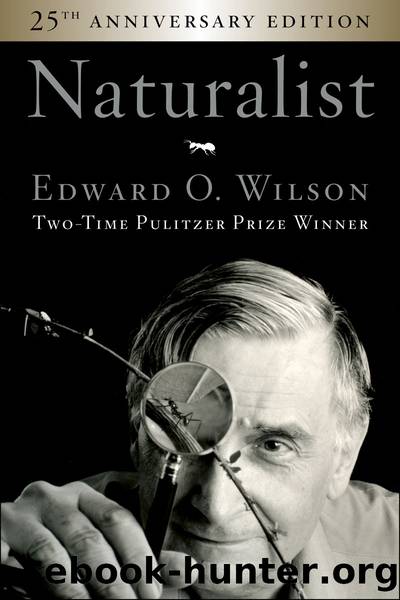Naturalist 25th Anniversary Edition by Wilson Edward O.;

Author:Wilson, Edward O.;
Language: eng
Format: epub
Publisher: Island Press
Published: 2006-07-15T00:00:00+00:00
*E. O. Wilson and W. L. Brown, “The Subspecies Concept and Its Taxonomic Application,” Systematic Zoology 2(3) (1953): 97–111.
*W. L. Brown and E. O. Wilson, “Character Displacement,” Systematic Zoology 5(2) (1956): 49–64·
*“Adaptive Shift and Dispersal in a Tropical Ant Fauna,” Evolution 13(1) (1959): 122–144; “The Nature of the Taxon Cycle in the Melanesian Ant Fauna,” American Naturalist 95 (1961): 169–193.
chapter twelve
THE MOLECULAR WARS
WITHOUT A TRACE OF IRONY I CAN SAY I HAVE BEEN BLESSED with brilliant enemies. They made me suffer (after all, they were enemies), but I owe them a great debt, because they redoubled my energies and drove me in new directions. We need such people in our creative lives. As John Stuart Mill once put it, both teachers and learners fall asleep at their posts when there is no enemy in the field.
James Dewey Watson, the codiscoverer of the structure of DNA, served as one such adverse hero for me. When he was a young man, in the 1950s and 1960s, I found him the most unpleasant human being I had ever met. He came to Harvard as an assistant professor in 1956, also my first year at the same rank. At twenty-eight, he was only a year older. He arrived with a conviction that biology must be transformed into a science directed at molecules and cells and rewritten in the language of physics and chemistry. What had gone before, “traditional” biology—my biology—was infested by stamp collectors who lacked the wit to transform their subject into a modern science. He treated most of the other twenty-four members of the Department of Biology with a revolutionary’s fervent disrespect.
At department meetings Watson radiated contempt in all directions. He shunned ordinary courtesy and polite conversation, evidently in the belief that they would only encourage the traditionalists to stay around. His bad manners were tolerated because of the greatness of the discovery he had made, and because of its gathering aftermath. In the 1950s and 1960s the molecular revolution had begun to run through biology like a flash flood. Watson, having risen to historic fame at an early age, became the Caligula of biology. He was given license to say anything that came to his mind and expect to be taken seriously. And unfortunately, he did so, with a casual and brutal offhandedness. In his own mind apparently he was Honest Jim, as he later called himself in the manuscript title of his memoir of the discovery—before changing it to The Double Helix. Few dared call him openly to account.
Watson’s attitude was particularly painful for me. One day at a department meeting I naively chose to argue that the department needed more young evolutionary biologists, for balance. At least we should double the number from one (me) to two. I informed the listening professors that Frederick Smith, an innovative and promising population ecologist, had recently been recruited from the University of Michigan by Harvard’s Graduate School of Design. I outlined Smith’s merits and stressed the importance of teaching environmental biology. I
Download
This site does not store any files on its server. We only index and link to content provided by other sites. Please contact the content providers to delete copyright contents if any and email us, we'll remove relevant links or contents immediately.
Hit Refresh by Satya Nadella(8338)
When Breath Becomes Air by Paul Kalanithi(7264)
The Girl Without a Voice by Casey Watson(7263)
Do No Harm Stories of Life, Death and Brain Surgery by Henry Marsh(6337)
A Court of Wings and Ruin by Sarah J. Maas(6078)
Hunger by Roxane Gay(4219)
Shoe Dog by Phil Knight(4169)
Everything Happens for a Reason by Kate Bowler(4067)
A Higher Loyalty: Truth, Lies, and Leadership by James Comey(4033)
The Rules Do Not Apply by Ariel Levy(3906)
Tuesdays with Morrie by Mitch Albom(3832)
The Immortal Life of Henrietta Lacks by Rebecca Skloot(3826)
How to Change Your Mind by Michael Pollan(3679)
Millionaire: The Philanderer, Gambler, and Duelist Who Invented Modern Finance by Janet Gleeson(3569)
All Creatures Great and Small by James Herriot(3517)
Elon Musk by Ashlee Vance(3455)
Tokyo Vice: An American Reporter on the Police Beat in Japan by Jake Adelstein(3440)
Man and His Symbols by Carl Gustav Jung(3315)
The Money Culture by Michael Lewis(3284)
